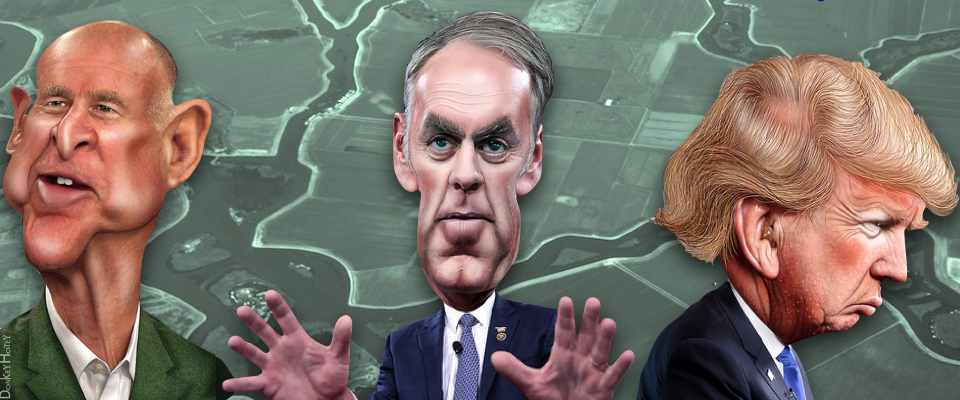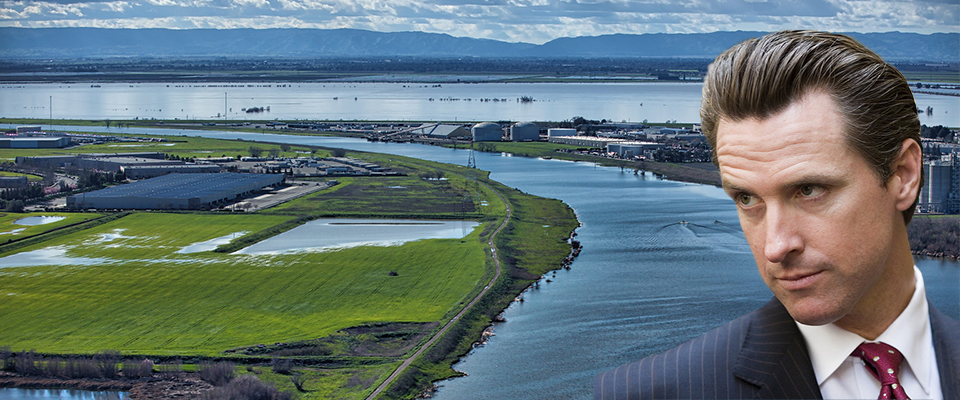It’s hard to generate a great deal of excitement over water. The language that governs its development and disposition is wonky and snooze-inducing; and, hey, I just turned on the tap to wash my hands and water came out, so what’s the problem?
Well, plenty. Battles over California water having been going on since the Gold Rush, and they really heated up in the mid-twentieth Century, when Southern California noticed that Northern California had most of the state’s water.
The latest campaign in California’s water wars centers on the Twin Tunnels project, a recent iteration of the long-defunct Peripheral Canal — a scheme to divert water from the Sacramento River around the Sacramento/San Joaquin Delta to south state farms and cities. One of the project’s chief supporters is David Sunding, the Thomas J. Graff Professor in the College of Natural Resources and the co-director of the Berkeley Water Center. A highly respected expert on water policy, Sunding will release a report on the benefits and impacts of the project next week.
The original Peripheral Canal was one of Jerry Brown’s pet projects during his first tenure as Governor, but was ultimately defeated in a state referendum in 1982.
But Brown didn’t give up. On re-assuming the governorship in 2011, he quickly resurrected the idea of a Delta “conveyance system.” But this time, he called for two tunnels, not a canal – to be buried under the Delta, rather than skirting it. Same basic idea, though: move a lot of water from the north to the south.
At first, plenty of people liked the idea — and not just the farmers in the western San Joaquin Valley and the huge urban water districts of the south state. Some mainline conservation groups such as the Nature Conservancy also signaled tentative support, intrigued by the massive habitat restoration projects that were part of the plan.
But now, a good deal of the ardor has faded. (Full disclosure: I consult for environmental organizations, including some that oppose the Twin Tunnels.) The waning enthusiasm is largely due to the high cost of the project (perhaps upward of $50 billion), coupled with the fact that it will do nothing to augment water supplies — it is, after all, a mere water conveyance system. The quantity of water available to California’s farms and cities will, as always, depend on how much snow falls in the Sierra Nevada and the Trinity/Siskiyou mountains. In a drought year, the water going through the tunnels could be reduced to a trickle.
Still, the project and its authorizing document, the Bay Delta Conservation Plan (BDCP), retain plenty of supporters – including Sunding whose report is intended to fulfill a pledge by the Brown administration to reveal all the upsides and downsides of the BDCP.
Funded by the state Department of Water Resources and researched by the Brattle Group under Sunding’s leadership, the study is expected to strike a generally upbeat note on the BDCP. No surprise, then, that the mere anticipation of the report’s release has many environmentalists and fisheries advocates fuming.
They point out Sunding’s report is not the comprehensive dissection of the BDCP originally promised by the Brown administration. As state officials acknowledge, it’s more of an analysis of the benefits that will accrue to agricultural and urban contractors. The remainder of Californians, say Twin Tunnels critics – commercial fishermen, farmers in the Delta (who could lose water and land to the project), sport anglers, wildlife advocates, regular folks – are ignored.
We’ve queried Professor Sunding for comment, and will pass on his observations when we receive them.
Meanwhile, Bill Jennings, the executive director of the California Sportfishing Protection Alliance, expresses deep unhappiness with advance word of the report. Jennings has been litigating Delta water issues for three decades — usually successfully — and he says the study will be more apologia than analysis.
“Sunding has already acknowledged that his report is not a full benefit/cost analysis, and comes from the perspective of the contractors,” Jennings wrote in an email. “(The) report is too limited and biased.”
Jennings later expanded on his concerns in a phone call.
“We just don’t understand how an economic analysis can be prepared when we don’t know how much water the project will deliver, how it will be operated, or how construction and operation costs will be apportioned among beneficiaries,” Jennings said. “The fact is that DWR could not allow Dr. Sunding to conduct their long-promised benefit/cost analysis because they realized (it) would unveil the enormous waste and inefficient use of California’s water supplies, and the vast public subsidies benefitting special interests.”
We are anxious to hear from Sunding.
–Glen Martin



















